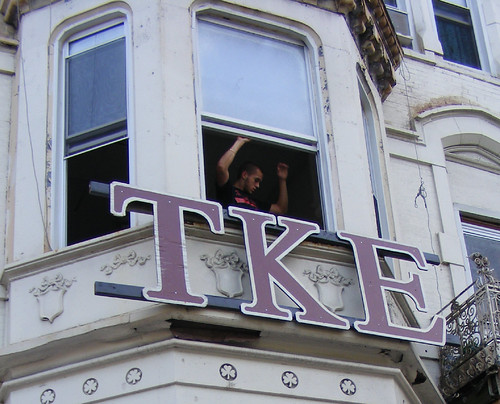The word “frat” often carries with it about a hundred stereotypes.
For new students who may not know, most fraternities and sororities do not live up to the binge drinking and hazing images generated by popular media about Greek life.
In fact, hazing is a third-degree misdemeanor in Pennsylvania.

Professional Greek letter organizations such as Phi Mu Alpha and Sigma Alpha Iota or pre-health organizations like Alpha Epsilon Delta are alive on Temple’s campus, carving a niche for groups who study and play together.
Genisha Wallace, president of the National Pan-Hellenic Council and a senior criminal justice and psychology major said participating in Greek life is about finding the right fit before you pledge.
“Know yourself first. [Greek organizations are] definitely not for everyone, just like every college isn’t for everyone, or even the idea of going to college isn’t for everyone,” Wallace said.
About 1 percent of Temple students are a part of a Greek organization. Recruits must achieve and maintain at least a 2.5 grade point average to continue membership.
The NPHC is an umbrella organization for historically black fraternities and sororities. The organization is one of the four governing councils part of the Temple University Greek Association. Also included are the Interfraternity Council, Multicultural Greek Council and Panhellenic Association.
Panhellenic recruitment begins Sept. 15 and IFC rush events begin Sept. 23.
“Some are more geared toward political awareness. Some are more geared toward health issues and public service. Some are a little bit more social,” Wallace said. “Every organization has its own mission statement and its own organizations that [it works] with.”
The 24 organizations that make up TUGA do not include many other Greek organizations on campus.
Professionally-themed fraternities and sororities are equally active in Temple’s community.
Wallace is a member of Delta Sigma Theta Sorority Inc., a group that frequently works with community services that assist individuals with sickle cell anemia.
“A lot of times you may not see all the service that we do, but we do a great deal of service in our organization. That’s actually what we’re about, service, first and foremost,” Wallace said.
Greek organization memberships are deemed an acceptable bullet to include on a résumé and may grant other career perks as well.
“It’s something that you put on a resume, but it’s so much more than that,” Wallace said. “It’s just really encouraging to meet lawyers, doctors, different professional women who you have something in common with.”
Wallace said being a part of a sorority is like “having thousands of mentors.”
Tn Ngo, president of the IFC branch at Temple, would agree.
“No one should ever be afraid to put a Greek organization on their résumé. A frat is like a business,” Ngo said.
Ngo said fraternity life is based on leadership roles that help gain perspective into the real world.
His leadership experience in Kappa Sigma led him to the opportunity to work as an operations manager, a job title generally reserved for post-graduates.
Ngo said a fraternity that hazes new members also gives them a “number one reason not to join.”
“If the fraternity wanted you to be a brother, they wouldn’t hurt you,” he said. “There’s no reason to build a brotherhood based on hazing.”
Ngo and Wallace agree that carefully deciding which Greek organization to join is important, as it is a very personal choice to make.
“Most of the organizations under NPHC say you need 30 credits, at least, so you’re usually not eligible until your sophomore year,” Wallace said.
Ngo said he seeks to keep the student body aware that IFC frats are “here to work and to progress on campus.”Recently, the council has made efforts to “raise the level of the jurisdiction and penalty” for people driving under the influence.
Caitlyn Conefry can be reached at caitlyn.conefry@temple.edu.



Be the first to comment